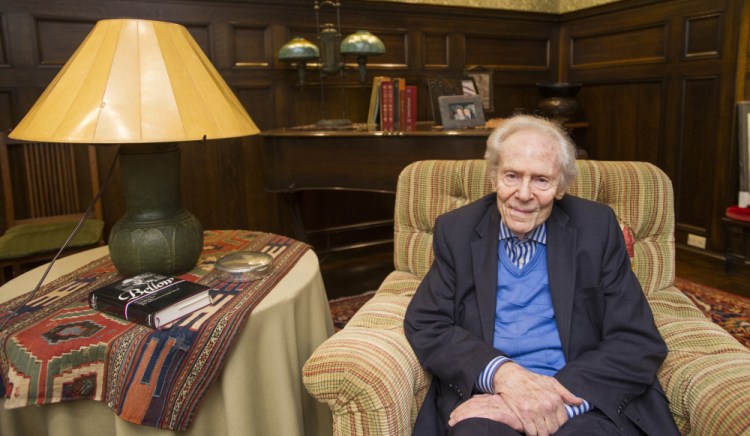LAWRENCE, Mass. — After one of the worst fires in the history of New England leveled most of Malden Mills on Dec. 11, 1995, the company’s chief executive officer, Aaron Feuerstein, kept nearly 3,000 workers on the payroll and paid for their health insurance.
His generosity ultimately may have cost him control of the company.
If he had to do it all over again, would he?
“The answer is yes,” he said emphatically Thursday, speaking with The Eagle-Tribune by telephone from his Brookline home. Feuerstein, who will turn 90 on Dec. 19, is often referred to as a “mensch,” a Yiddish word that describes a person of strong character and honor.
Immediately after the fire, Feuerstein said he would rebuild the company.
Naturally, Malden Mills, founded by Feuerstein’s grandfather, Henry Feuerstein in 1906, faced serious financial problems in the wake of such a catastrophe.
“GE Capital did the financing,” Feuerstein said. Several years after the fire, “they demanded that the loan be paid up immediately,” he said. This forced Malden Mills into bankruptcy, he said, and he lost control of the company.
A new company, Polartec, was established and has continued to manufacture the durable fleece fabric of the same name developed by Malden Mills.
Polartec straddles the Methuen-Lawrence city line on Broadway.
STAYING IN U.S. COSTLY
Malden Mills expanded into Lawrence in the late 1950s, Feuerstein said, because the city “had excellent textile labor.”
The textile mills that had made Lawrence famous headed south for cheaper labor, he noted. This migration left thousands of Lawrence residents without jobs.
Feuerstein acquired the Arlington Mills property on Broadway. During its heyday, the Arlington was one of the largest textile mills in New England.
When Feuerstein bought the buildings, they were vacant.
Feuerstein pointed out that the Lawrence mill owners “made a fortune during the war (World War II)” when the government needed cloth for its soldiers and sailors. Many of those companies eventually located their manufacturing operations in China and other countries, Feuerstein said.
“I considered it immoral and unethical,” he said.
Feuerstein said he would have been able to stay in business longer if he had been willing to move his manufacturing overseas. The creditors advised him to do that, he said.
“GE pulled the plug,” he said, but he added, “They stuck with me for some time.”
Feuerstein said he regrets the loss of American manufacturing to other countries. The U.S. government, he said, has allowed this.
“I consider it almost a treasonous act,” he said.
Does this industrialist think the American textile industry could be resuscitated?
“Yes, I do,” he said. Automated textile machinery, he said, could provide jobs to Americans. There is also the time factor, he said.
Factories and mills in China and other countries produce goods much more cheaply than their American counterparts, but it takes a lot longer for them to move their products to retailers in the United States, he noted.
KEEPING WORKERS SATISFIED
Many entrepreneurs and business owners don’t like unions. Feuerstein has a different outlook. Malden Mills employees were represented by the International Ladies Garment Workers Union.
“We never had any serious problems,” Feuerstein said. There was squabbling from time to time, but workers did not see management as the enemy, he said.
“You have to have a healthy and satisfied workforce,” he said. Keeping workers’ pay below the poverty line, he said, will lead to the “fall of capitalism.”
It is regrettable, Feuerstein said, that business schools teach that making money for the shareholders is the sole obligation of a corporation. The noted economist Milton Friedman espoused that philosophy, he said.
At least a few people have compared Feuerstein to Arthur T. Demoulas, owner and CEO of Market Basket, whose employees and customers supported him with a work stoppage and boycott when his cousin, Arthur S. Demoulas, tried to take over the company.
Market Basket workers were loyal to Arthur T. because he pays them good wages. He commanded customers’ loyalty because they appreciate the lower prices in his supermarkets.
“He is well thought of,” Feuerstein said of Arthur T. Demoulas.
Although he’s retired from running a major textile company, Feuerstein keeps himself busy. He spends a lot of time reading and studying the Bible in both English and Hebrew, he said.
He also enjoys reading classical literature and memorizing poetry.
“I am doing my damnedest” to stay active, he said. He used to run for an hour each day and kept running until he was 80.
His condominium has two floors and walking up and down the stairs keeps him physically active.
“I am completely self-reliant,” he said.
Feuerstein’s faith is very important to him.
The Young Israel of Brookline synagogue, a congregation of Orthodox Jews, will be honoring him with a 90th birthday party.
Copy the Story LinkSend questions/comments to the editors.



Success. Please wait for the page to reload. If the page does not reload within 5 seconds, please refresh the page.
Enter your email and password to access comments.
Hi, to comment on stories you must . This profile is in addition to your subscription and website login.
Already have a commenting profile? .
Invalid username/password.
Please check your email to confirm and complete your registration.
Only subscribers are eligible to post comments. Please subscribe or login first for digital access. Here’s why.
Use the form below to reset your password. When you've submitted your account email, we will send an email with a reset code.